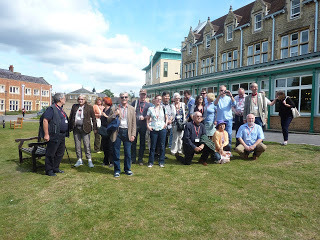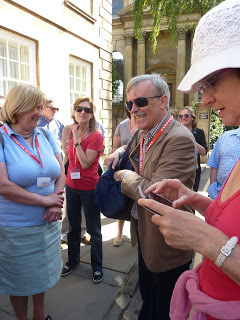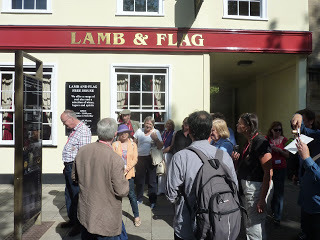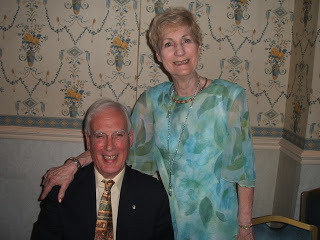Martin Edwards's Blog, page 217
September 6, 2013
Forgotten Book - The Missing Link
The Missing Link, the first of three detective novels published by Katharine Farrer, was one of the books I covered in my Oxford literary tour last week. First published in 1952, it was reissued a few years back by the admirable Rue Morgue Press, and Tom and Enid Schantz of Rue Morgue included a very informative introduction. Farrer was the wife of an eminent theologian, Austin Farrer,and the couple were friendly with the likes of C.S. Lewis and Dorothy L. Sayers.
They lived in Oxford,where this book is set. Katharine fell for Austin while she was a student at St Anne's College, and almost inevitably she made her Detective Inspector, Richard Ringwood, an Oxford graduate. He's from the school of gentlemanly cops, and we first encounter him at the Mitre (a pub that holds a special place in my own affections), talking to his fiancee Claire Liddicote. He's not happy to be disturbed by a call to investigate the apparent abduction of a small baby, brought up (in a rather weird way) by a couple called the Links. Hence the title, which is capable of no fewer than three interpretations - rather clever.
Katharine Farrer was elected to the Detection Club on the strength of just three books, and to be honest, it has crossed my mind that she may have owed this honour almost as much to personal connections as to the quality of her detective fiction, since after her election, she never wrote another mystery. Her life, like her literary career, seems to have faded in sad fashion. The Schanttzes explain that she was very highly strung, and turned to drink and drugs. There's no hint of such failings in this novel, but I must say that I felt it was a genuine curiosity rather than any sort of a masterpiece.
Ringwood is human and likeable, and there is a very powerful and entirely original climax to the story. The culprit's motive is, I am sure, unique in the genre, and I do love unusual motives. These are great strengths, but frankly they would have combined to make a brilliant short story. For a novel, they are not quite enough. The culprit is fairly obvious from the start, and the storyline meanders rather tediously. I became disillusioned long before the dramatic and unorthodox finale. I found the humour so-so and the treatment of social issues well-meant but very dated..I'm glad I read this odd baby-theft story,but I would like to think that Farrer's other two novels are more gripping than this one.
They lived in Oxford,where this book is set. Katharine fell for Austin while she was a student at St Anne's College, and almost inevitably she made her Detective Inspector, Richard Ringwood, an Oxford graduate. He's from the school of gentlemanly cops, and we first encounter him at the Mitre (a pub that holds a special place in my own affections), talking to his fiancee Claire Liddicote. He's not happy to be disturbed by a call to investigate the apparent abduction of a small baby, brought up (in a rather weird way) by a couple called the Links. Hence the title, which is capable of no fewer than three interpretations - rather clever.
Katharine Farrer was elected to the Detection Club on the strength of just three books, and to be honest, it has crossed my mind that she may have owed this honour almost as much to personal connections as to the quality of her detective fiction, since after her election, she never wrote another mystery. Her life, like her literary career, seems to have faded in sad fashion. The Schanttzes explain that she was very highly strung, and turned to drink and drugs. There's no hint of such failings in this novel, but I must say that I felt it was a genuine curiosity rather than any sort of a masterpiece.
Ringwood is human and likeable, and there is a very powerful and entirely original climax to the story. The culprit's motive is, I am sure, unique in the genre, and I do love unusual motives. These are great strengths, but frankly they would have combined to make a brilliant short story. For a novel, they are not quite enough. The culprit is fairly obvious from the start, and the storyline meanders rather tediously. I became disillusioned long before the dramatic and unorthodox finale. I found the humour so-so and the treatment of social issues well-meant but very dated..I'm glad I read this odd baby-theft story,but I would like to think that Farrer's other two novels are more gripping than this one.
Published on September 06, 2013 03:27
September 5, 2013
Half a million plus...
Ten days or so ago, this blog sauntered past a milestone of sorts. This came when it chalked up half a million pageviews. In previous posts about the vagaries of blogging statistics, I've made the point that they aren't to be taken too seriously, but I'm certainly pleased that the trend this year has been markedly upwards. From my point of view, it's motivating that a good many people take an interest. A few other stats - I've done just over 1,700 posts, and there have been close on 9,000 comments (this figure includes my own replies, so I imagine the reader response figure is more like 6,000) for which I'm extremely grateful.
I'm also grateful for the emails that I receive relating to what I've said on the blog. I've learned a good deal from these, and I must say that blogging has introduced me to a host of new people, whom I probably wouldn't have come across otherwise, which has been great. I feel that the blog has more than repaid the time I put into it, thanks to reader reaction.
I'm conscious that there are some things I should do better, and I'm also well aware that I'm not keeping up terribly well at present with some of the other fine blogs that are out there - many of which are listed on the blogroll. Striking a balance between blogging, Twitter, and writing my own fiction (never mind the day job) is and will no doubt remain a challenge.
As for my thoughts on Twitter....I'm simply not sure. At present, though, I'm continuing to do some tweeting, though I find it easiest to tweet these posts. Maybe, like many things, it's a good idea to keep practising in the hope of improvement. I was talking to another blogger at St Hilda's the other day, and she (like a few other people I've spoken to lately) are unconvinced about the merits of Twitter for writers. But I guess the answer is that different forms of social media will suit different people. There is unlikely to be a single 'right' way forward. The question is - what works for you?
For me, therefore, blogging remains my preferred way of dipping a toe in the sometimes muddy waters of interaction via the internet. I said a while back that I'd do a few posts about the experience of writing my new novel. Since then, I've been silent on the subject, I know. Why? I'm afraid I haven't made much progress with the new book yet - but I'm keen to get going with it now....Honest.
I'm also grateful for the emails that I receive relating to what I've said on the blog. I've learned a good deal from these, and I must say that blogging has introduced me to a host of new people, whom I probably wouldn't have come across otherwise, which has been great. I feel that the blog has more than repaid the time I put into it, thanks to reader reaction.
I'm conscious that there are some things I should do better, and I'm also well aware that I'm not keeping up terribly well at present with some of the other fine blogs that are out there - many of which are listed on the blogroll. Striking a balance between blogging, Twitter, and writing my own fiction (never mind the day job) is and will no doubt remain a challenge.
As for my thoughts on Twitter....I'm simply not sure. At present, though, I'm continuing to do some tweeting, though I find it easiest to tweet these posts. Maybe, like many things, it's a good idea to keep practising in the hope of improvement. I was talking to another blogger at St Hilda's the other day, and she (like a few other people I've spoken to lately) are unconvinced about the merits of Twitter for writers. But I guess the answer is that different forms of social media will suit different people. There is unlikely to be a single 'right' way forward. The question is - what works for you?
For me, therefore, blogging remains my preferred way of dipping a toe in the sometimes muddy waters of interaction via the internet. I said a while back that I'd do a few posts about the experience of writing my new novel. Since then, I've been silent on the subject, I know. Why? I'm afraid I haven't made much progress with the new book yet - but I'm keen to get going with it now....Honest.
Published on September 05, 2013 02:44
September 4, 2013
Sophie Hannah, Hercule Poirot, and following in Agatha Christie's Footsteps
News that Sophie Hannah is to write a brand new novel featuring Agatha Christie's legendary Belgian detective Hercule Poirot has attracted a great deal of attention today. And this is no surprise, for 120 years after her birth, Christie remains a writer popular the world over, her books held in affectionate regard by people of every class,culture and creed. So what are we to make of the prospect of a new Poirot story?
The first thing to say is that, if you accept that reviving Poirot is a good idea, then in my opinion, Sophie Hannah is an excellent choice. She has been quoted speaking admiringly of Christie, and I can testify that this is not in any way a recent or cynical conversion prompted by the temptation of a high profile contract. The very first time I met Sophie was some years ago, shortly after the publication of her highly successful debut, Little Face. We were both taking part in a literary event at the Brindley in Runcorn, and someone asked panel members who our favourite crime writers were. I opted for one deceased writer, and one contemporary novelist - Christie and Ruth Rendell. And Sophie said that I'd taken the words out of her mouth, as they were also her favourites.
So I am confident that Sophie Hannah will bring to the task a genuine love of and respect for Christie's story-telling, as well as a great deal of craft. Sophie, like Christie, started out as a poet, though I think it's fair to say that her poetry is more successful than Christie's. Her crime novels are elaborately plotted,and this respect for plot is vital in anyone trying to emulate Christie.
But it won't be easy. I enjoy writing Sherlockian pastiches, but part of the appeal is the rich and evocative nature of Conan Doyle's prose and Watson's narrative voice. With Christie, the style is much plainer. And that can be a trap in itself. Charles Osborne, a man steeped in Christie's work, wrote novelisations of some of her plays a few years ago, but I'm afraid that even though he had all the raw material from Christie, ther results seemed to me to be curiously flat and lifeless - in a way that Christie's best books emphatically are not, whatever her detractors say.
How does a talented writer restrain the impulse to indulge in a few nice but unChristie-like literary flourishes? Should she do so? Well, my personal feeling is that, with a project like this, it's prudent not to deviate too far from the original style and approach. Because if you do, what is the point?
Some may also ask, what is the point of the new book(s) in any case? Of course, it's all about commercialism, and "refreshing the brand". It's been done with the Anthony Horowitz take on Sherlock, and with Sebastian Faulks and others writing James Bond. Whilst some purists may shudder, I don't. I think it's worth remembering that crime fiction is a genre where commerciality and entertainment have always been important and for my part, I'm very much looking forward to seeing how Sophie Hannah rises to this new challenge. And more than that, I find the prospect of a high quality new Poirot novel really rather exciting.
The first thing to say is that, if you accept that reviving Poirot is a good idea, then in my opinion, Sophie Hannah is an excellent choice. She has been quoted speaking admiringly of Christie, and I can testify that this is not in any way a recent or cynical conversion prompted by the temptation of a high profile contract. The very first time I met Sophie was some years ago, shortly after the publication of her highly successful debut, Little Face. We were both taking part in a literary event at the Brindley in Runcorn, and someone asked panel members who our favourite crime writers were. I opted for one deceased writer, and one contemporary novelist - Christie and Ruth Rendell. And Sophie said that I'd taken the words out of her mouth, as they were also her favourites.
So I am confident that Sophie Hannah will bring to the task a genuine love of and respect for Christie's story-telling, as well as a great deal of craft. Sophie, like Christie, started out as a poet, though I think it's fair to say that her poetry is more successful than Christie's. Her crime novels are elaborately plotted,and this respect for plot is vital in anyone trying to emulate Christie.
But it won't be easy. I enjoy writing Sherlockian pastiches, but part of the appeal is the rich and evocative nature of Conan Doyle's prose and Watson's narrative voice. With Christie, the style is much plainer. And that can be a trap in itself. Charles Osborne, a man steeped in Christie's work, wrote novelisations of some of her plays a few years ago, but I'm afraid that even though he had all the raw material from Christie, ther results seemed to me to be curiously flat and lifeless - in a way that Christie's best books emphatically are not, whatever her detractors say.
How does a talented writer restrain the impulse to indulge in a few nice but unChristie-like literary flourishes? Should she do so? Well, my personal feeling is that, with a project like this, it's prudent not to deviate too far from the original style and approach. Because if you do, what is the point?
Some may also ask, what is the point of the new book(s) in any case? Of course, it's all about commercialism, and "refreshing the brand". It's been done with the Anthony Horowitz take on Sherlock, and with Sebastian Faulks and others writing James Bond. Whilst some purists may shudder, I don't. I think it's worth remembering that crime fiction is a genre where commerciality and entertainment have always been important and for my part, I'm very much looking forward to seeing how Sophie Hannah rises to this new challenge. And more than that, I find the prospect of a high quality new Poirot novel really rather exciting.
Published on September 04, 2013 04:13
September 2, 2013
The Oxford Literary Tour


 Some months ago, Janet Laurence told me that she was organising a conference for AIEP, the international crime writers' association, to take place in Oxford, and asked if I'd be willing to conduct a guided literary tour of Oxford. Now I have no experience whatsoever as a tour guide, so I felt I was a rather unlikely choice. But Janet is a very persuasive person, so I said yes.
Some months ago, Janet Laurence told me that she was organising a conference for AIEP, the international crime writers' association, to take place in Oxford, and asked if I'd be willing to conduct a guided literary tour of Oxford. Now I have no experience whatsoever as a tour guide, so I felt I was a rather unlikely choice. But Janet is a very persuasive person, so I said yes.I didn't know what to expect. Not just whether the weather would be kind, which of course was impossible to predict, but how many people would want to go on such a tour, how good their English would be, how energetic they would feel - or anything, really. So preparing was a bit tricky. I realised that I'd have to be flexible and see how things went on the day.
The AIEP conference went on throughout last week, but because of work commitments, I was only able to turn up for the latter stages. However, I found everyone very welcoming and it was fascinating to meet the international contingent, as well as locals such as Susan Moody, Bob Cornwell, Christine Poulson, and Barry Forshaw.I also had an enjoyable evening after dinner in a pub with Michael Ridpath and a number of foreign writers.
To my relief, the tour proved to be great fun. About 35 people came along, and I took them around the city, talking about some of the books set there as we went along. We toured the quadrangles of Balliol, and had a drink in the Eagle and Child, where once the Inklings met, drank and talked. Myfanwy Cook kindly acted as tour photographer!
The last major event of the conference was an after dinner speech by a former top cop, Dame Elizabeth Neville. Janet was given a standing ovations, which she richly deserved. A sign of the esteem in which she is held by the international crime writing community, and a sign too of how much they appreciated their time in Britain. I made a number of delightful new friends, and despite my initial misgivings, in the end I was very glad that Janet asked me to be a tour guide - at least for one afternoon in my life!



Published on September 02, 2013 02:18
August 30, 2013
Forgotten Book - I Am Jonathan Scrivener
The book I'm going to talk about today is one I'd never heard of (nor had I heard of its author) until I read a post on that excellent blog, Pretty Sinister Books, where John Norris praised it highly. John managed to get me really intrigued, and since a newish reprint is readily available, I sought it out. The Forgotten Book is I Am Jonathan Scrivener, and its Forgotten Author is Claude Houghton.
Back in the Thirties, both the novel and its creator gathered an impressive list of admirers. These included such diverse figures as Henry Miller, Hugh Walpole, Clemence Dane and P.G Wodehouse. Walpole and Dane even published a short appreciation of Houghton's work. In the present day, Houghton's fans include Michael Dirda, who contributes an enthusiastic intro to the new edition of the book (there is also a short piece by Walpole.)
It's a distinctive story, not quite like anything else I've ever read. There certainly seems to me to be an influence from Franz Kafka, but then again, the style is not really like Kafka. It's a genuine one-off. The story is narrated by James Wrexham, and he applies for a job as a secretary to a man of independent means who is about to leave the country. He gets the job, and is told by a solicitor that his new employer is called Jonathan Scrivener, and that he can live in Scrivener's house and, in effect, do as he pleases.
Various acquaintances of Scrivener turn up at the house, and they all seem keen to see Scrivener again, but equally, there is an air of mystery about the man. In particular, he seems to have made different impressions on each of them. What is Scrivener up to? I found this a fascinating, and often witty book, which held my interest despite a distinct lack of action. It's a book full of ideas, but none the worse for that. I enjoyed reading it, and although I don't claim it as a major masterpiece, it's astonishing that it's slipped so far from view until recently. And also, from a writer's point of view, sobering.
Back in the Thirties, both the novel and its creator gathered an impressive list of admirers. These included such diverse figures as Henry Miller, Hugh Walpole, Clemence Dane and P.G Wodehouse. Walpole and Dane even published a short appreciation of Houghton's work. In the present day, Houghton's fans include Michael Dirda, who contributes an enthusiastic intro to the new edition of the book (there is also a short piece by Walpole.)
It's a distinctive story, not quite like anything else I've ever read. There certainly seems to me to be an influence from Franz Kafka, but then again, the style is not really like Kafka. It's a genuine one-off. The story is narrated by James Wrexham, and he applies for a job as a secretary to a man of independent means who is about to leave the country. He gets the job, and is told by a solicitor that his new employer is called Jonathan Scrivener, and that he can live in Scrivener's house and, in effect, do as he pleases.
Various acquaintances of Scrivener turn up at the house, and they all seem keen to see Scrivener again, but equally, there is an air of mystery about the man. In particular, he seems to have made different impressions on each of them. What is Scrivener up to? I found this a fascinating, and often witty book, which held my interest despite a distinct lack of action. It's a book full of ideas, but none the worse for that. I enjoyed reading it, and although I don't claim it as a major masterpiece, it's astonishing that it's slipped so far from view until recently. And also, from a writer's point of view, sobering.
Published on August 30, 2013 07:00
August 28, 2013
Jack Reacher - movie review
Jack Reacher is the film version of Lee Child's best-seller One Shot. There's been a lot of debate about whether Tom Cruise is appropriately cast as the much taller Reacher, but for me, this is not a key issue. What really matters is whether Cruise captures the essence of the character. I'd say that he's not perfect, but pretty good, and certainly good enough. And the decision to cast Robert Duvall and the menacing Werner Herzog in smaller but important roles was quite inspired - and I bet it was a real thrill for Lee Child to see these two appearing in the first film of his work.
The story begins with a sniper firing six times and killing five people. The overwhelmingly likely suspect is rounded up and soon reduced to a coma. His lawyer, Rosamund Pike (whose professional dress code is rather different from that of all the other female lawyers I know) is thrown into conflict with the D.A., who just happens to be her dad. The suspect, for mysterious reasons, scrawls a message, "Get Jack Reacher". And as if by magic, Reacher appears.
I was baffled by the scene in which Pike questions Cruise and tells him that the conversation is legally privileged. Given that he is not her client, this can only be right if American law is significantly different from English law. Well, I can only presume that it is, but this did jar with me. On the whole, however, the film sprints along in the style we associate with Bond and Bourne, and it makes for good light entertainment.
Lee Child takes the craft of the thriller seriously, which helps to explain his massive success. I've read and enjoyed a number of Lee Child books, but not One Shot. One of the others borrowed a famous plot device from Agatha Christie, and the same trick is pulled here. The excellent director, Christopher McQuarrie, does not go into much detail about the motive for the crime, and we don't have much backstory about Herzog's character. This is a real pity - I suppose McQuarrie felt these elements needed to be cut to maintain pace. So overall, not a masterpiece, but good fun. And despite the casting of Cruise, I'm sure the film will make even more people want to read Lee Child's bestsellers. They will, I think, find them even more entertaining than this lively and action-packed movie.
The story begins with a sniper firing six times and killing five people. The overwhelmingly likely suspect is rounded up and soon reduced to a coma. His lawyer, Rosamund Pike (whose professional dress code is rather different from that of all the other female lawyers I know) is thrown into conflict with the D.A., who just happens to be her dad. The suspect, for mysterious reasons, scrawls a message, "Get Jack Reacher". And as if by magic, Reacher appears.
I was baffled by the scene in which Pike questions Cruise and tells him that the conversation is legally privileged. Given that he is not her client, this can only be right if American law is significantly different from English law. Well, I can only presume that it is, but this did jar with me. On the whole, however, the film sprints along in the style we associate with Bond and Bourne, and it makes for good light entertainment.
Lee Child takes the craft of the thriller seriously, which helps to explain his massive success. I've read and enjoyed a number of Lee Child books, but not One Shot. One of the others borrowed a famous plot device from Agatha Christie, and the same trick is pulled here. The excellent director, Christopher McQuarrie, does not go into much detail about the motive for the crime, and we don't have much backstory about Herzog's character. This is a real pity - I suppose McQuarrie felt these elements needed to be cut to maintain pace. So overall, not a masterpiece, but good fun. And despite the casting of Cruise, I'm sure the film will make even more people want to read Lee Child's bestsellers. They will, I think, find them even more entertaining than this lively and action-packed movie.
Published on August 28, 2013 02:26
August 25, 2013
What Remains - BBC TV review: episode one
What Remains started last night, and episode one was very watchable for (at least) three reasons. First, the script by Tony Basgallop explores the lonely bleakness of one aspect of London society, where a person can die and not be missed for a very long time. Apparently, a tragic real life case formed part of the inspiration for the story. In What Remains, the mummified remains of a woman called Melissa are discovered in the loft of the house where she lived. Nobody had seen her for ages, and everyone says they thought she had moved out.
Second, the victim lived in a house divided into several flats,and a number of people living there are potential suspects. They include a dodgy teacher (well played by David Bamber) and two women whose relationship is falling apart. Really, the house offers a "closed community" familiar from many traditional whodunits,but the feel of this show is bleak and far from traditional.
A long time ago, I made regular visits to a shared house in London over the course of two or three years. The occupants rented their rooms, rather than owning separate flats,but What Remains did remind me strongly of that house and the eclectic community formed by its residents. I was very conscious at the time that the people who lived there were linked by nothing other than an address, and that tensions could rise between near-strangers just as they can rise between family members. I even thought that one day I might write a story with such a background....
The third strength of episode one was the performance of David Threlfall as Len, the cop who is about to retire when he is called out to look into Melissa's death. He too is lonely and clearly loneliness is going to be the key theme of this story, and may even be relevant to the motive for murder - assuming that Melissa was murdered, as I do, of course. I really enjoyed the understated way Threlfall tackled the part of Len, a man with whom one can readily empathise. I'll definitely be watching this one next week.
Second, the victim lived in a house divided into several flats,and a number of people living there are potential suspects. They include a dodgy teacher (well played by David Bamber) and two women whose relationship is falling apart. Really, the house offers a "closed community" familiar from many traditional whodunits,but the feel of this show is bleak and far from traditional.
A long time ago, I made regular visits to a shared house in London over the course of two or three years. The occupants rented their rooms, rather than owning separate flats,but What Remains did remind me strongly of that house and the eclectic community formed by its residents. I was very conscious at the time that the people who lived there were linked by nothing other than an address, and that tensions could rise between near-strangers just as they can rise between family members. I even thought that one day I might write a story with such a background....
The third strength of episode one was the performance of David Threlfall as Len, the cop who is about to retire when he is called out to look into Melissa's death. He too is lonely and clearly loneliness is going to be the key theme of this story, and may even be relevant to the motive for murder - assuming that Melissa was murdered, as I do, of course. I really enjoyed the understated way Threlfall tackled the part of Len, a man with whom one can readily empathise. I'll definitely be watching this one next week.
Published on August 25, 2013 16:46
August 23, 2013
Forgotten Book - Top Storey Murder
Life's too short to read all the books that one would like to try. And it's certainly too short to re-read books that are somewhat disappointing. But my Forgotten Book for today is a title which I felt was a bit of a let down originally, but which I liked rather better the second time around. Perhaps that it is because the author was Anthony Berkeley, who confounded my expectations originally, but whose contradictory way with story-telling I've come to value highly.
The book in question is Top Storey Murder. It was written at around the same time as Berkeley produced his masterpiece, Malice Aforethought, under the name of Francis Iles,but it's a very different book .As often, the detective is Roger Sheringham, the most engagingly fallible of all "great" detectives of the Golden Age. Roger is outsmarted by Moresby of the Yard nearly as often as he triumphs over him. And this book is a case in point.
Sheringham, cheeky as ever, involves himself in Moresby's investigation into the murder of Mrs Barnett, someone who (like so many victims in Berkeley's books) dies unmourned. Her niece Stella is one of the suspects, and Roger finds himself attracted to her, while wondering if she is a killer. A range of other people who live in Monmouth Mansions, where the dead woman was found, also come under suspicion.
This novel is a good example of the way Berkeley liked to play games with the detective story. Not just the game of "whodunit", but tricks with plot and perpectives on the nature of justice. When I first read Top Storey Murder, I felt that the ending was a bit of a cheat, and I'm still sure that the nature of the resolution of the mystery is a key reason why this book is not one of Berkeley's best. But it's more interesting than I gave it credit for, the first time I read it. Berkeley set out to be different, and this is one more story when he succeeded in his aim.
The book in question is Top Storey Murder. It was written at around the same time as Berkeley produced his masterpiece, Malice Aforethought, under the name of Francis Iles,but it's a very different book .As often, the detective is Roger Sheringham, the most engagingly fallible of all "great" detectives of the Golden Age. Roger is outsmarted by Moresby of the Yard nearly as often as he triumphs over him. And this book is a case in point.
Sheringham, cheeky as ever, involves himself in Moresby's investigation into the murder of Mrs Barnett, someone who (like so many victims in Berkeley's books) dies unmourned. Her niece Stella is one of the suspects, and Roger finds himself attracted to her, while wondering if she is a killer. A range of other people who live in Monmouth Mansions, where the dead woman was found, also come under suspicion.
This novel is a good example of the way Berkeley liked to play games with the detective story. Not just the game of "whodunit", but tricks with plot and perpectives on the nature of justice. When I first read Top Storey Murder, I felt that the ending was a bit of a cheat, and I'm still sure that the nature of the resolution of the mystery is a key reason why this book is not one of Berkeley's best. But it's more interesting than I gave it credit for, the first time I read it. Berkeley set out to be different, and this is one more story when he succeeded in his aim.
Published on August 23, 2013 02:50
August 21, 2013
Southcliffe: episode 4 - TV review
Southcliffe finished on Sunday night, but I only caught up with episode four 48 hours later. Having loved the series at the outset what did I make of it, having now watched the whole drama? The series has, I think it's fair to say, rather divided opinion. Some absolutely love it. Some hate it. Others think it began well but then fell apart.
Well, the first point I'd make is that a series that can provoke such a range of reactions must have something to be said for it. Midsomer Murders it ain't. This is a story about a spree killer, and the consequences of his actions for a tight-knit community. And I'm still full of admiration for Tony Grisoni's writing, and in particular the actors (especially Eddie Marsan and Shirley Henderson), though I did think that some parts of the story (Shirley Henderson's increasingly frenzied attempts to deal with the death of her daughter, above all) were developed at the expense of others which intrigued and tantalised..
There is a bleak and depressing mood throughout the four episodes, and anyone looking for comfortable entertainment should look elsewhere, but for me, Grisoni did very well to come up with an ending that felt broadly positive, despite the absence of clear or easy answers to the issue of spree killing and its complicated motivations. The structure of the storyline was unorthodox, but extremely interesting from a technical point of view, and I felt that even though the story seemed to meander at times, the refusal to settle for obvious sub-plots was a real strength.
There's certainly much more that can be said about spree killers, and I'm not sure that the finale contributed to our understanding of what makes them act the way they do. But Southclife was an original piece of work that kept me interested and thinking hard, even when I might have preferred to look away. I don't suggest it was perfect, but I'm very glad I watched it.
Well, the first point I'd make is that a series that can provoke such a range of reactions must have something to be said for it. Midsomer Murders it ain't. This is a story about a spree killer, and the consequences of his actions for a tight-knit community. And I'm still full of admiration for Tony Grisoni's writing, and in particular the actors (especially Eddie Marsan and Shirley Henderson), though I did think that some parts of the story (Shirley Henderson's increasingly frenzied attempts to deal with the death of her daughter, above all) were developed at the expense of others which intrigued and tantalised..
There is a bleak and depressing mood throughout the four episodes, and anyone looking for comfortable entertainment should look elsewhere, but for me, Grisoni did very well to come up with an ending that felt broadly positive, despite the absence of clear or easy answers to the issue of spree killing and its complicated motivations. The structure of the storyline was unorthodox, but extremely interesting from a technical point of view, and I felt that even though the story seemed to meander at times, the refusal to settle for obvious sub-plots was a real strength.
There's certainly much more that can be said about spree killers, and I'm not sure that the finale contributed to our understanding of what makes them act the way they do. But Southclife was an original piece of work that kept me interested and thinking hard, even when I might have preferred to look away. I don't suggest it was perfect, but I'm very glad I watched it.
Published on August 21, 2013 02:34
August 20, 2013
Meg Elizabeth Atkins R.I.P.
After returning home from St Hilda's, and the happy experience of meeting a good many old friends, it was very sad to learn of the loss of someone I've known since the start of my career as a crime writer. This was Meg Elizabeth Atkins, who died at home on Saturday after a long illness borne with great courage.
Meg and her husband Percy attended the inaugural meeting of the Northern Chapter of the CWA where, more than 25 years ago, I had my first introduction to the sociable world of crime writing. Meg and Percy were, from that day on, stalwarts of the Northern Chapter, and they organised numerous events for us all to enjoy over the years.
The photo of Meg and Percy that accompanies this post was taken at the 20th anniversary Northern Chapter lunch. Naturally I was delighted to see them when we celebrated our 25th anniversary at Pickering last autumn, but by then it was clear that Meg was quite poorly. Even so, she and Percy came along to the CWA's annual conference this spring at Windermere, the last time I saw her. Suffice to say that throughout all the time I knew her, Meg displayed a sparkling sense of humour and vivacious personality which were not noticeably dimmed when she was diagnosed with terminal cancer. A very brave person.
And also a good writer, although far from prolific. Her books appeared infrequently and at irregular intervals.and I think this is why her work is not as often discussed as it might otherwise have been. Her first novel appeared almost fifty years ago, but had less than a dozen successors in the intervening years, perhaps the best known being Palimpsest and Cruel as the Grave.
I shall miss her.

Meg and her husband Percy attended the inaugural meeting of the Northern Chapter of the CWA where, more than 25 years ago, I had my first introduction to the sociable world of crime writing. Meg and Percy were, from that day on, stalwarts of the Northern Chapter, and they organised numerous events for us all to enjoy over the years.
The photo of Meg and Percy that accompanies this post was taken at the 20th anniversary Northern Chapter lunch. Naturally I was delighted to see them when we celebrated our 25th anniversary at Pickering last autumn, but by then it was clear that Meg was quite poorly. Even so, she and Percy came along to the CWA's annual conference this spring at Windermere, the last time I saw her. Suffice to say that throughout all the time I knew her, Meg displayed a sparkling sense of humour and vivacious personality which were not noticeably dimmed when she was diagnosed with terminal cancer. A very brave person.
And also a good writer, although far from prolific. Her books appeared infrequently and at irregular intervals.and I think this is why her work is not as often discussed as it might otherwise have been. Her first novel appeared almost fifty years ago, but had less than a dozen successors in the intervening years, perhaps the best known being Palimpsest and Cruel as the Grave.
I shall miss her.

Published on August 20, 2013 02:43



